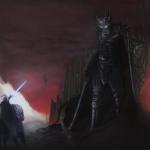I recently conducted an interview with Michael O’Brien at The Jesuit Post in which he commented on the current state of dystopian literature. He observed:
In short, authority in any form is presented as tragically flawed, and the solution presented is individualism combined with physical powers and, increasingly, distorted supernatural or preternatural powers. We all agree that tyranny is bad, but most people think it will be countered only when we, the “good” people, have enough knowledge and power—power of all kinds. In most story-lines this is usually combined with romance and sexual licentiousness—all the usual clichés about what freedom is. It’s basically an adolescent psychology. It would not stand up against any real tyrant, and surely not an Antichrist.
This analysis resonated with me, since I generally like dystopian literature and to some degree try to keep up with it. But I’m generally disappointed. Of course, I shouldn’t be surprised when adolescent dystopian literature — like The Hunger Games or Divergent — manifest an “adolescent psychology.” To be expected I guess. Although, as I’ve said before, The Hunger Games was at least a richer experience to the degree that as far as I could tell only one character in all three books manifested anything like Christian moral character. And I always like when an author doesn’t really side with anyone. Still, that only barely mitigated how bad I thought the third book was.
But when a dystopian book like The Road exchanges moments of true metaphysical insight concerning “borrowed time and borrowed world and borrowed eyes with which to sorrow it” for the whimpering individualistic conclusion that one must “carry the fire… that is inside you,” I despair again. What makes Michael O’Brien’s dystopian literature so much more appealing — and I can’t wait for his new novel Elijah in Jerusalem to come out — is that his Catholic imagination inspires him to posit real Tyrants and a real Eschatology, kind of like you find in Canticle for Leibowitz. Enjoy the interview.

















